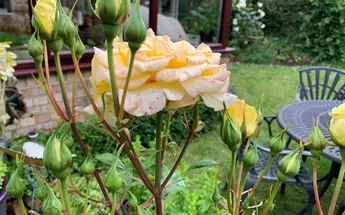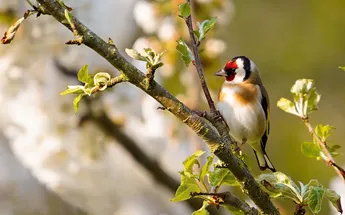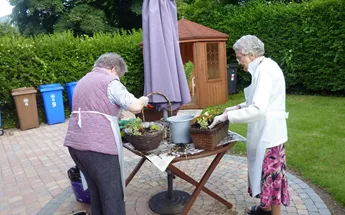Un-bee-lievable tips to encourage buzzy friends into your garden
Bees play a vital role in pollinating plants, helping them to produce fruits, vegetables, and seeds. Without bees, our gardens and crops would struggle to survive, so it's important to encourage them into our gardens whenever possible. In this blog, we'll explore some ways that you can encourage bees to visit your garden.
Plant bee-friendly flowers
An effective way to attract bees to your garden is to plant flowers that they are attracted to. Bees are attracted to brightly coloured flowers rich in nectar and pollen, so planting a variety of bee-friendly flowers can help draw them in. Some examples of bee-friendly flowers include lavender, sunflowers, dahlias, zinnias, and marigolds. Take a look at resident Frank Rhodes at Wey Valley House who takes great care in planting colourful flowers in the gardens.
Provide a water source
Bees need a source of water to survive, so providing a shallow dish of water in your garden can be a great way to encourage them to visit. Ensure the dish is filled with clean water, and place a few stones or pebbles in the dish so the bees have a place to rest while they drink. In hot weather the dish will dry out quickly, so be sure to check it on those sunny days!
Backyard Beekeeping has some top tips for the perfect water source for bees.

Avoid using pesticides and herbicides
Many pesticides and herbicides are toxic to bees, so it's important to avoid using these chemicals in your garden if possible. Instead, use natural methods to control pests and weeds, such as companion planting, crop rotation, and hand weeding. Crown Bees has some useful tips on how you can avoid pesticides and what you can try as an alternative.
Create nesting sites
There are several different species of bees, some of which nest in the ground, while others prefer to nest in hollow plant stems or cavities in wood. You can create nesting sites to provide a home for these important pollinators.
To create a nesting site, you can leave an area of your garden uncultivated or create a bee hotel out of a wooden box. Here are some materials you could use:
- Straw
- Bamboo
- Twigs
- Pinecones
- Bramble
- Reeds
Provide a variety of plants
Bees are attracted to a variety of plants, so it's important to have a diverse range of flowers, shrubs, and trees in your garden. This will help to provide a continuous supply of nectar and pollen throughout the growing season, which will keep bees coming back to your garden.
Here are some of the best plants for bees:
- Hardy geranium
- Campanula
- Foxglove
- Honeysuckle
- Snapdragon
- Clematis
- Bluebell
- Crab apple
- Crocus
Top tip - try to grow purple flowers as bees can see these more clearly than any other colour. Plants such as lavender, catmint and buddleia are ideal.
Gardeners World has some useful information and videos to help with choosing the right plant.
By taking a few simple steps, you can encourage bees to visit and thrive in your garden. By providing a range of bee-friendly flowers, a source of water, avoiding pesticides and herbicides, creating nesting sites, and providing a variety of plants, you can help to support these vital pollinators and contribute to the health and biodiversity of your garden and local ecosystem.
Next steps
The Health and Well-Being Benefits of Gardening
From helping to reduce stress to perhaps even being the secret to a longer life, we take a look at some of the many health and well-being benefits of gardening.
A guide to encouraging wildlife in your garden
No matter how big or how small your garden is, you can do your bit to encourage and help the wildlife around you.
Top gardening tips from green-fingered experts
Warm weather means one thing, it's time to get your gardening gloves on! In this blog we share some top tips from green-fingered experts.


